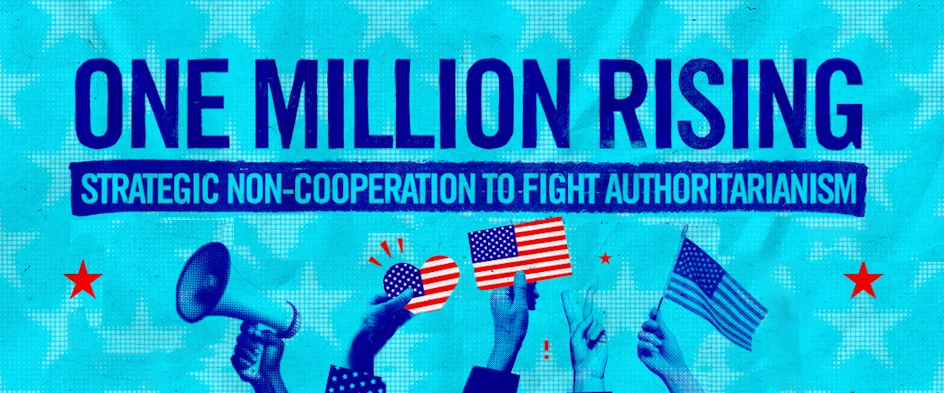
What Is This?
Real conversations with people that we know is how we can grow our movement. Reach out to others, help them understand the moment we’re in, and let them see themselves as part of the solution. It doesn't have to perfect, it doesn't have to be large: just taking the first step matters.
Bottom line: Power ultimately rests in the hands of millions of ordinary people who keep society running smoothly on a day-to-day basis, and we can shut it down if we so choose.
Quick Overview (Video)
Want more? Explore the full series on the One Million Rising YouTube channel.
Make It Your Own
Pick a format that fits you
- Structured presentation: use slides/notes and talk it through.
- Read & discuss: send a handout in advance; meet to talk.
- General chat: start with what’s on people’s minds; save deeper “pillars/authoritarianism” for next time.
- Improv role‑play: walk through everyday non‑cooperation scenarios.
- Story circle: each person shares one act of quiet resistance they’ve seen or done.
- Watch & discuss: play a short video clip, then Q&A.
- Small‑group brainstorm: map your workplaces, schools, faith groups, where could resistance spread?
Make it easy to say “yes”
- Invite 2–10 people you already know; co‑host if that feels better.
- Keep it simple: living room, backyard, coffee shop, library, Zoom.
- Food helps people relax.
- Open with personal connection; keep it conversational, not a lecture.
- Close with next steps and ask to commit to one small action: come to the next meeting, write a postcard to a voter, reach out to one person in the next 2 weeks.
- Follow up the next day with a thank‑you and an invite to a second gathering or a reminder of the possible next steps.
Common questions
- Who do I invite? Friends, neighbors, coworkers, faith or school contacts. Start with your real circles.
- What if I’m not an expert? You don’t need to be. Hosting is a guided conversation.
- Mobilize? Register your event so it’s counted and you get updates; collect RSVPs however you prefer.
- What do we actually do? Use one of the formats above; aim for connection + 1–2 concrete next steps.
Everyday actions to share
Point guests to our running list of practical small or large actions anyone can take right now, such as putting on resistance car stickers, asking to change propaganda channels in waiting rooms, quietly talking with a co-worker about non-cooperation, or joining a banner drop over a busy overpass.
Sample 60 Minute Agenda
- Welcome & why this matters (5)
- Personal check‑in: what’s on people’s minds (10)
- Core ideas: resistance & the “pillars” (10)
- Discuss and/or role-play (25)
- Recap & next steps (10)
